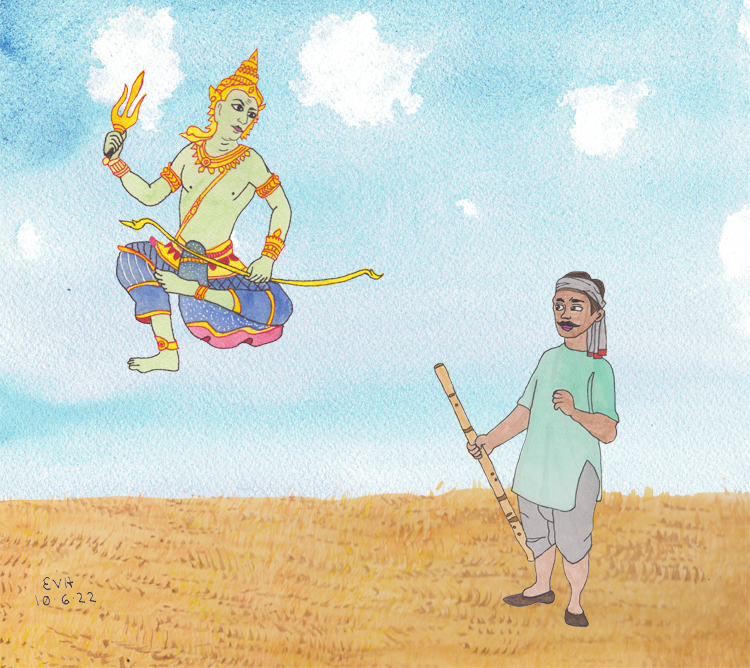
Jataka 372
Migapotaka Jātaka
The Young Deer
as told by Eric Van Horn
originally translated by H.T. Francis and R.A. Neil, Cambridge University
originally edited by Professor Edward Byles Cowell, Cambridge University
This is another story in which mourning for the dead is the theme. Ajahn Chah used to use this simile about the importance of this life. He used to say that if you put your hand in front of your face, it looks very large, and everything else looks very small. But if you stretch your arm outwards, the hand looks small in comparison to everything else. It’s not that this life is not important. It is very important. But it is just one life in an infinite number of lifetimes, and mourning for someone who has died—when death is inevitable—changes nothing. It simply brings you pain and hardship.
“To sorrow for the dead.” The Master told this story while he was at Jetavana. It is about a certain elder. It is said that he admitted a youth to the Saṇgha, and that this novice—after ministering to him diligently—bye and bye fell sick and died. The old man was overcome with grief at the youth’s death, and he went about loudly lamenting. The monks were unable to console him. They started a discussion in the Dharma Hall, saying, “A certain old man on the death of his novice goes about lamenting. By dwelling on the thought of death, he will surely become lost.” When the Master came in, he asked the monks what they were discussing. When he heard what it was, he said, “Not only now, but in the past also, the old man went about lamenting when this youth died." And with that he told them this story from the past.
Once upon a time during the reign of Brahmadatta, King of Benares, the Bodhisatta was reborn as Sakka (King of the Tāvatiṃsa heaven, which is the highest and most important deva realm). At that time a man who lived in the kingdom of Kāsi went to the Himālaya region. He adopted the life of a recluse, and he lived on wild fruits. One day he found a young deer in the forest that had lost its mother. He took the deer home to his hermitage where he fed and cherished it. The young deer grew up into a handsome and comely beast. The recluse took care of it, and he treated it as if it was his own child.
One day the young deer died of indigestion from overeating. The recluse went about lamenting. He said, “My child is dead.” Then Sakka, King of heaven, explored the world. He saw that recluse. And thinking to startle him, he went and hovered in the air and uttered the first stanza:
To sorrow for the dead does ill become
The lone recluse, free from the ties of home.
The recluse no sooner heard this than he uttered the second stanza:
Should man with beast consort, O Sakka, grief
For a lost playmate finds in tears relief.
Then Sakka repeated two stanzas:
Those who do not weep in course may still lament the dead,
Weep not, O sage, ’tis vain to weep the wise have said.
If by our tears we might prevail against the grave,
Then we would all unite our dearest ones to save.
While Sakka was speaking, the recluse recognized that it was useless to weep. So he sang the praises of Sakka, repeating three stanzas:
As oil-fed flame that blazes out like rain
Is quenched with water, so he quenched my pain.
With sorrow’s shaft my heart was wounded sore.
He healed my wound and did my life restore.
The barb extracted, full of joy and peace,
At Sakka’s words I from my sorrow cease.

Figure: “At Sakka’s words I from my sorrow cease.”
After admonishing the recluse, Sakka departed to his own place of abiding.
The Master here ended his lesson and identified the birth: “At that time the old man was the recluse, the novice was the deer, and I was Sakka.”
